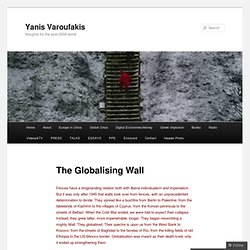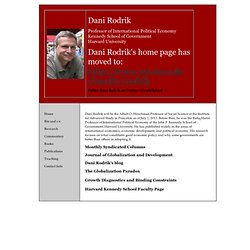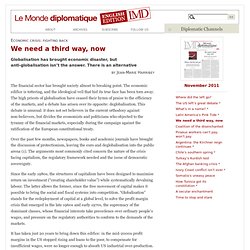

The Globalising Wall. Fences have a longstanding relation both with liberal individualism and imperialism.

But it was only after 1945 that walls took over from fences, with an unprecedented determination to divide. They spread like a bushfire from Berlin to Palestine, from the tablelands of Kashmir to the villages of Cyprus, from the Korean peninsula to the streets of Belfast. When the Cold War ended, we were told to expect their collapse. Instead, they grew taller, more impenetrable, longer. They began resembling a mighty Wall. Why? These questions emerged as part of an art project which led us, Danae Stratou and myself, to travel to seven of the world’s most notorious dividing lines.
PrefaceChapter 1 – INTRODUCTIONChapter 2 - CYPRUS: The Green LineChapter 3 – KOSOVOChapter 4 – BELFASTChapter 5- PALESTINEChapter 6 – ETHIOPIA-ERITREAChapter 7 – KASHMIRChapter 8: US-MEXICO Border Biographies of Yanis Varoufakis and Danae Stratou Like this: Like Loading... Rodrik_The Future of Economic Convergence. A Sane Globalization - Dani Rodrik. Will Globalization Go Bankrupt? In-depth analysis on Credit Writedowns Pro.

You are here: Economy » Will Globalization Go Bankrupt? By Michael Pettis About ten years ago I published an article in Foreign Policy that I just recently re-read. In the article I extended one of the arguments I made in my book, The Volatility Machine, that the globalization process is driven primarily by monetary expansion and the consequent increase in risk appetite. What was new in this piece, because I hadn’t realized it when I wrote my book, is that every period of globalization coincided with a stage of the industrial revolution in which accompanying the expansion in international trade and capital flows is a major technological boom, driven also by monetary expansion. After re-reading the article I thought it might be useful to republish it on my blog with a couple of comments while waiting for the next entry (which should come out this week). Will Globalization Go Bankrupt? Eight years later, however, markets around the world collapsed.
The globalisation of revolution. To listen to the hype about social networking websites and the Egyptian revolution, one would think it was Silicon Valley and not the Egyptian people who overthrew Mubarak.

Via its technologies, the West imagines itself to have been the real agent in the uprising. Since the internet developed out of a US Defense Department research project, it could be said the Pentagon did it, along with Egyptian youth imitating wired hipsters from London and Los Angeles. Most narratives of globalisation are fantastically Eurocentric, stories of Western white men burdened with responsibility for interconnecting the world, by colonising it, providing it with economic theories and finance, and inventing communications technologies.
Of course globalisation is about flows of people as well, about diasporas and cultural fusion. But neither version is particularly useful for organising resistance to the local dictatorship. Nothing new about globalisation Post-revolution struggle. The Globalization Paradox: Hardback: Dani Rodrik. A leading economist sounds a warning note over globalization's desirability and viabilityAn enlightening history of world trade and economics over the last century Pinpoints the conflict of interests between democracy, national determination, and economic globalization Presents the case for a new type of globalizationFor a century, economists have driven forward the cause of globalization in financial institutions, labour markets, and trade.

Yet there have been consistent warning signs that a global economy and free trade might not always be advantageous. Where are the pressure points? What could be done about them?
Dani Rodrik. Dani Rodrik will be the Albert O.

Hirschman Professor of Social Science at the Institute for Advanced Study in Princeton as of July 1, 2013. Before then, he was the Rafiq Hariri Professor of International Political Economy at the John F. Kennedy School of Government, Harvard University. He has published widely in the areas of international economics, economic development, and political economy. His research focuses on what constitutes good economic policy and why some governments are better than others in adopting it. Monthly Syndicated Columns.
We need a third way, now. The financial sector has brought society almost to breaking point.

The economic edifice is tottering, and the ideological veil that hid its true face has been torn away. The myth of decoupling...